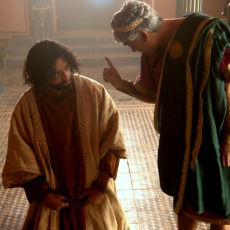Scripture
Matthew 26:63-68, NRSV
Then the high priest said to [Jesus], “I put you under oath before the living God, tell us if you are the Messiah, the Son of God.” Jesus said to him, “You have said so. But I tell you, From now on you will see the Son of Man seated at the right hand of Power and coming on the clouds of heaven.” Then the high priest tore his clothes and said, “He has blasphemed! Why do we still need witnesses? You have now heard his blasphemy. What is your verdict?” They answered, “He deserves death.” Then they spat in his face and struck him; and some slapped him, saying, “Prophesy to us, you Messiah! Who is it that struck you?”
Consider
For a believer who loves the Lord, this is a difficult passage to read. Like Peter, we may want to grab a sword and lop off someone’s ear, anything to fight back against the sickening corruption that compelled those jealous religious leaders to silence, by every means possible, the irritating Nazarene who threatened their power.
Picture the room: Torches flaring because the night is still dark, making it difficult to read the expressions on the faces of his accusers. Betrayed by a disciple he loved, abandoned by the rest, Jesus stands alone before the religious council and Caiaphas, the high priest who purports to know and speak for God Himself.
Yet Jesus is not alone, indeed, has never been alone. Always at one with the Father, he knows exactly who he is and why he now stands before this hostile group. When he might offer a brilliant defense or turn the tables on his accusers and attack them, he instead gives a clear statement of his divinity. He offers Caiaphas one last chance to come to faith and acknowledge God’s truth: that Jesus is the divine Son of God and the means by which the high priest might truly find and know God.
In this crucial moment, when he knows his mortal life hangs in the balance, Jesus demonstrates that he cares more about saving Caiaphas than saving himself. He looks with compassion upon this jealous, frightened, and desperate man and offers him the only way out of his religious trap.
How can we follow Jesus’ example? In our world of personal betrayals and brutalities, of social injustice and political upheavals, we might set aside our defenses and confront our opponents with this same compassion. We can try to look past the fiery language or cruel behaviors to see a person in pain or in fear. Perhaps there is a spiritual battle going on, where evil has taken hold of a person’s heart and won’t let go.
When we choose to confront our adversaries with compassion, we can stand like Jesus in the truth of who Christ is and who we are in him. With love that only comes from God, we can pray for our enemies, as Jesus did from the cross where they nailed him to die, and trust God for the outcome.
Pray
Heavenly Father, teach me the compassionate way of Jesus. Drop the scales from my eyes and help me to see beyond my own fear and pain to perceive others clearly. Give me the love I need to pray for those who hurt and offend me and strength to stand firm in my faith.
Reflect
Isaiah 49:13-16; Matthew 9:36-38
Ponder
How might compassion shift your perception of your offender? How might God want you to pray for this person?



